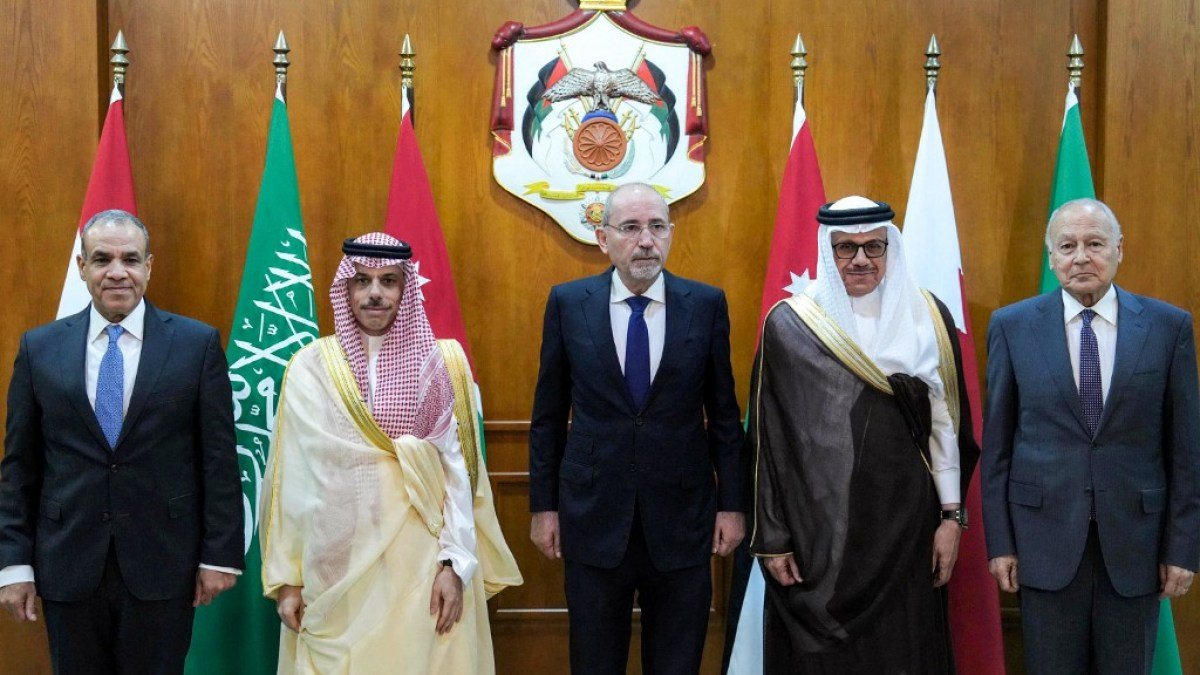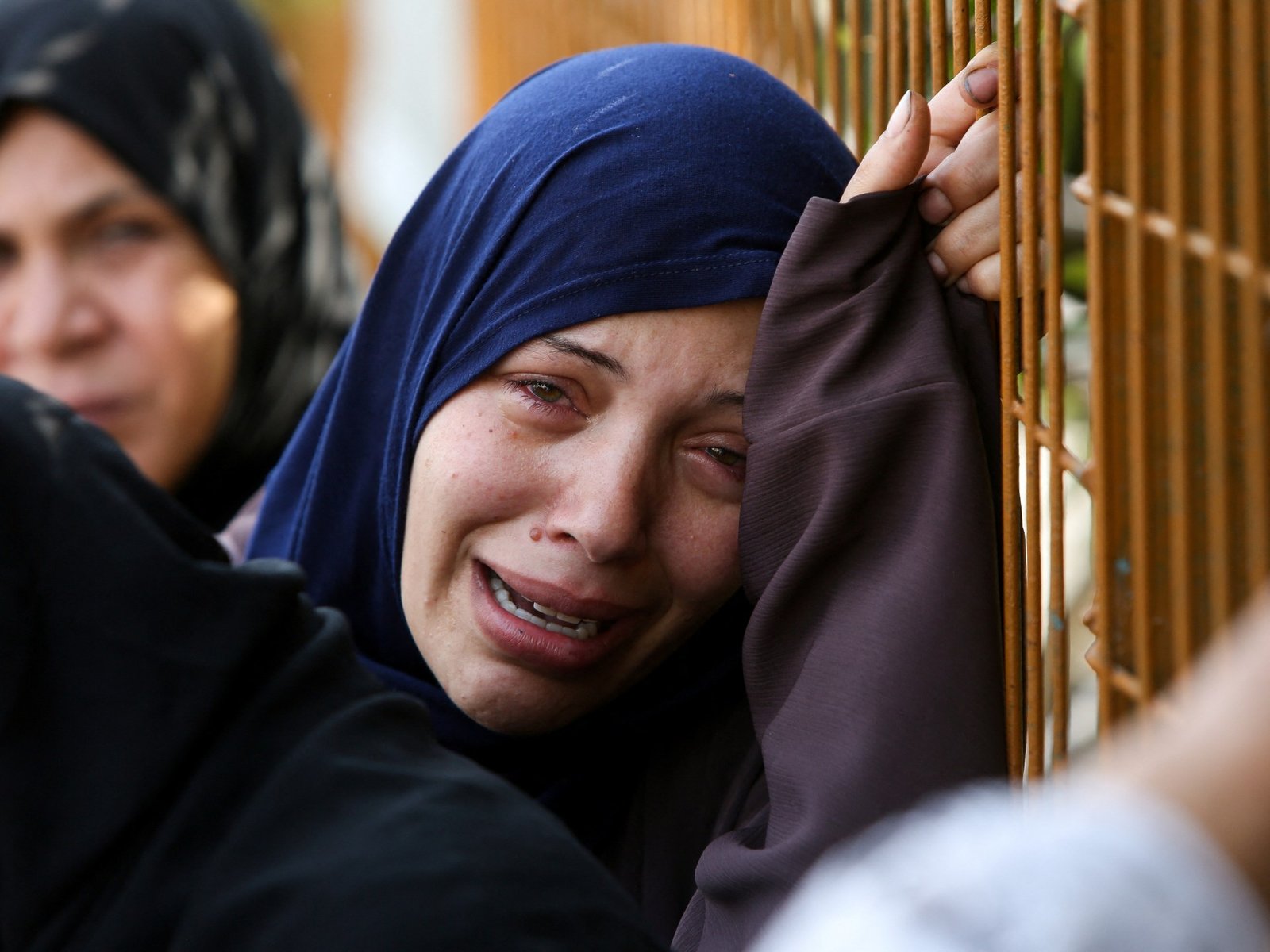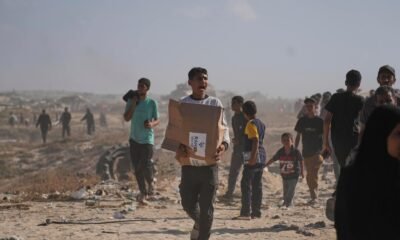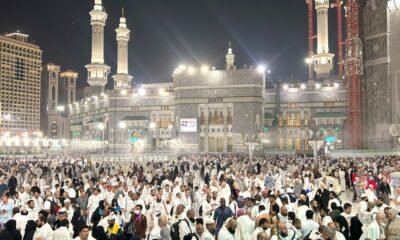Middle East
What does Israel cutting off Gaza’s electricity mean? | Israel-Palestine conflict News

Israel says it has cut off electricity to Gaza in what seems like another attempt to force Hamas to accept changes it wants to impose upon the ceasefire terms agreed in January.
Israel imposed a blockade of humanitarian aid entering Gaza early in March in an attempt to force Hamas into extending the ceasefire’s first phase and releasing more captives.
It wants to do that to avoid moving to the second phase, which would entail a permanent end to the war.
Aid agencies, human rights organisations and countries, including some of Israel’s allies, have denounced the decision, citing its humanitarian impact and international laws prohibiting the collective punishment of a civilian population.
But according to statements from Gaza and media reports, this power cut announcement is not as it seems.
Here’s everything we know:
What exactly did Israel announce?
It said all electricity it provides to Gaza will be cut.
In a social media post on Sunday, Israeli Energy Minister Eli Cohen said he had “cut off electricity to the Gaza Strip immediately”.
“Enough with the talk, it’s time for action!” he said on the day before another round of ceasefire negotiations in Doha.
However, according to Israeli media, the announcement may be less dramatic than its proponents have made it appear.
You mean Gaza won’t go dark?
It was already dark.
According to The Times of Israel, all electricity from Israel into Gaza was already cut in the wake of the Hamas-led attacks of October 7, 2023, during which 1,139 people were killed in southern Israel and about 250 people were captured and taken to Gaza.
In November, the electricity supply to a desalination plant near Deir el-Balah in central Gaza was restored. The plant supports about 600,000 mostly displaced civilians in central and southern Gaza.
The plant will now subsist on stored power, generators and what remains of the solar panels not damaged or destroyed by Israeli shelling.

Did Israel only cut electricity and aid?
No.
In its attempt to revise the terms of the ceasefire it signed in January, Israel has also launched military strikes across the enclave and has told the media it is preparing a resumption of fighting in Gaza.
The Ministry of Health in Gaza has issued daily summaries of civilians killed during the ceasefire.
Palestinians in Rafah, where Israel now wants to keep a military presence in violation of the ceasefire, have been attacked by Israeli tanks and drones since Friday, killing at least three people and wounding more.
How has Hamas responded?
In a statement issued on Sunday night, Hamas accused Israel of “cheap blackmail”.
“We strongly condemn the occupation’s decision to cut off electricity to Gaza, after depriving it of food, medicine, and water,” Izzat al-Risheq, a member of Hamas’s political bureau, wrote, characterising the move as “a desperate attempt to pressure our people and their resistance”.

“Cutting off electricity, closing the crossings, stopping aid, relief and fuel, and starving our people, constitutes collective punishment and a full-fledged war crime,” al-Risheq added.
Who supports Israel in this?
The United States.
Israel says its current blockade of Gaza is in fact to force Hamas to comply with a proposal from US envoy Steve Witkoff involving extending the first phase of the ceasefire and returning a number of the Israeli captives.
Witkoff has yet to publicly confirm his role in the plan he is widely credited with having devised.
However, speaking to journalists before Monday’s talks in Doha, Witkoff confirmed his and the US administration’s continued full support for Israel, up to and including joint US and Israeli military action against Hamas.
At the same time, the US is conducting direct talks with Hamas over the release of five captives with US citizenship who are held by the group, only one of whom is thought to be alive.

Who doesn’t support Israel in these blockades?
Pretty much everyone else.
Both Egypt and Qatar, who have mediated the ceasefire talks, as well as Saudi Arabia and Jordan released statements this month criticising the Israeli move to block food, medicine and fuel into the Strip.
“Humanitarian aid should never be contingent on a ceasefire or used as a political tool,” France, Germany and the United Kingdom said in a joint statement on Wednesday.
The Office of the United Nations High Commissioner for Human Rights and the International Criminal Court, which issued arrest warrants for Israeli Prime Minister Benjamin Netanyahu and former Defence Minister Yoav Gallant last year, condemned the block on aid.
International rights groups, such as Human Rights Watch and Amnesty International, have also condemned the renewed blockade, describing it as a breach of international law and a crime against humanity.
How could this affect the ongoing negotiations in Qatar?
That remains to be seen.
Hamas said in a statement it has “dealt flexibly” with mediators, including US envoy Adam Boehler, who is overseeing the direct talks on the US captives, and hopes to proceed to the agreed-upon stage two of the ceasefire.
As part of those talks, Israeli media reports said, Hamas is considering parallel US demands made “over Israel’s head” that the current stage of the ceasefire be extended for 60 days in exchange for the return of 10 living Israeli captives.
Middle East
Saudi Arabia calls Israel barring Arab ministers West Bank trip ‘extremism’ | Israel-Palestine conflict News

Foreign ministers from Egypt, Jordan, Qatar, Saudi Arabia, and the UAE had planned the visit to discuss Palestinian statehood and end to war on Gaza.
Saudi Arabia has accused Israel of “extremism and rejection of peace” after it blocked a planned visit by Arab foreign ministers to the occupied West Bank.
Saudi Foreign Minister Prince Faisal bin Farhan Al Saud made the remarks during a joint news conference in Jordan’s capital, Amman, on Sunday with his counterparts from Jordan, Egypt, and Bahrain.
“Israel’s refusal of the committee’s visit to the West Bank embodies and confirms its extremism and refusal of any serious attempts for [a] peaceful pathway … It strengthens our will to double our diplomatic efforts within the international community to face this arrogance,” Prince Faisal said.
His comments followed Israel’s decision to block the Arab delegation from reaching Ramallah, where they were set to meet Palestinian President Mahmoud Abbas. The ministers from Egypt, Jordan, Qatar, Saudi Arabia, and the United Arab Emirates (UAE) had planned the visit as part of efforts to support Palestinian diplomacy amid Israel’s ongoing war on Gaza.
Israel controls the airspace and borders of the West Bank, and on Friday announced it would not grant permission for the visit.
“The Palestinian Authority – which to this day refuses to condemn the October 7 massacre – intended to host in Ramallah a provocative meeting of foreign ministers from Arab countries to discuss the promotion of the establishment of a Palestinian state,” an Israeli official had said, adding that Israel will “not cooperate” with the visit.
Prince Faisal’s trip to the West Bank would have marked the first such visit by a top Saudi official in recent memory.
Jordan’s Foreign Minister Ayman Safadi said blocking the trip was another example of how Israel was “killing any chance of a just and comprehensive” Arab-Israeli settlement.
An international conference, co-chaired by France and Saudi Arabia, is due to be held in New York from June 17 to 20 to discuss the issue of Palestinian statehood.
Egyptian Foreign Minister Badr Abdelatty said the conference would cover security arrangements after a ceasefire in Gaza and reconstruction plans to ensure Palestinians would remain on their land and foil any Israeli plans to evict them.
Israel has come under increasing pressure from the United Nations and European countries, which favour a two-state solution to the Israeli-Palestinian conflict, under which an independent Palestinian state would exist alongside Israel.
Middle East
Why Hamas is seeking to change the US-proposed Gaza ceasefire deal | Gaza

Palestinian group Hamas claims a recent ceasefire proposal passed to them by United States special envoy Steve Witkoff is different from one they had agreed to a week earlier.
Basem Naim, a leading Hamas official, told Al Jazeera on Saturday that the group “responded positively” to the latest proposal relayed by Witkoff, even though it offered “no guarantees to end the war”, according to Naim.
Israel has killed more than 54,000 Palestinians since October 2023, and its total aid blockade since March has caused starvation and a famine-like situation in Gaza, home to 2.3 million people, most of whom were displaced by 19 months of relentless bombardment.
Amid international pressure, Israel has allowed a trickle of aid into Gaza, which has been described as a “drop in an ocean” by humanitarian groups.
Here’s what you need to know about the ceasefire proposal.

Did Hamas reject the ceasefire proposal?
According to the group, no.
It says it responded positively but added a few key provisions.
What are the key points in Hamas’s proposal?
There are a few.
Hamas has responded to the latest US-proposed ceasefire with demands for a pathway to a permanent ceasefire, instead of a temporary one where the Israeli government could unilaterally restart hostilities as they did in March.
They have also called for a full withdrawal of Israeli forces from the Gaza Strip and the resumption of aid and assistance to the besieged area.

What are the key differences in this proposal and the one Witkoff relayed to Hamas?
Witkoff proposed a 60-day pause in hostilities. After that, the parties (Israel and Hamas) would work to agree to extend the pause.
The issue with this is that the last time it happened, Israel unilaterally decided to cut aid to Gaza and started bombing it. To avoid a similar scenario, Hamas has tried to negotiate on the timeline for releasing the captives, 10 of them alive and 18 bodies of those killed during the war. Witkoff’s proposal called for the release to take place within a week of the 60-day pause.
However, Hamas fears Israel will resume its bombing campaign upon the release of the captives, so it has called for staggering their release throughout the pause.
It has called for a set list of negotiation topics to avoid what has happened in past negotiations with Israel, where Prime Minister Benjamin Netanyahu added provisions in what critics say was an attempt to derail talks and prolong the war.
According to the website Drop Site News, Hamas also reinserted a provision from the May 25 agreement that Israel had withdrawn.
That provision would be for Hamas to hand over the governing of Gaza to “an independent technocratic committee”.

What is the US reaction to Hamas’s additions?
Witkoff called Hamas’s response “totally unacceptable” and said it “only takes us backward”.
“Hamas should accept the framework proposal we put forward as the basis for proximity talks, which we can begin immediately this coming week,” he wrote on X, formerly Twitter.
“That is the only way we can close a 60-day ceasefire deal in the coming days in which half of the living hostages and half of those who are deceased will come home to their families and in which we can have at the proximity talks substantive negotiations in good-faith to try to reach a permanent ceasefire.”
I received the Hamas response to the United States’ proposal. It is totally unacceptable and only takes us backward.
Hamas should accept the framework proposal we put forward as the basis for proximity talks, which we can begin immediately this coming week.
That is the only…
— Office of the Special Envoy to the Middle East (@SE_MiddleEast) May 31, 2025
US President Donald Trump previously said the two sides were nearing a deal.
What is Israel saying?
The US and Israel seem to be in agreement on the terms.
Israel claims its officials agreed with the US proposal for a 60-day ceasefire.
White House press secretary Karoline Leavitt said Israel “backed and supported” the new proposal.
Netanyahu criticised the Hamas response, parroting Witkoff and laying the blame on the Palestinian group for failing to accept the proposal.

“As Witkoff said, Hamas’s response is unacceptable and sets the situation back. Israel will continue its action for the return of our hostages and the defeat of Hamas,” Netanyahu said.
If the US and Israel agree, why is Hamas holding out?
Hamas is wary of past instances where Israel chose to unilaterally break the ceasefire. That happened in March, when Netanyahu decided to block all aid from entering Gaza and restart the war.
Tamer Qarmout, an associate professor at the Doha Institute for Graduate Studies, described the negotiations between Hamas and Israel as taking place with “no good faith whatsoever”.
“They [Israel] are fixated on one key goal, which is Hamas’s capitulation and surrender, and disappearing from the scene,” Qarmout told Al Jazeera.
“Hamas is engaged in these negotiations just to try to reduce the horrors of the war, to allow some humanitarian aid to enter and to also look for a dignified exit. No one in Hamas wants to see themselves surrendering this way.”
What happens now?
In the interim, Israel is continuing to attack Gaza.
On Sunday, Israeli forces opened fire on Palestinians who had gathered at aid distribution sites run by a US-backed group, Gaza Humanitarian Foundation, in southern and central Gaza. At least 31 people were killed in Rafah and another near the Netzarim Corridor.
Meanwhile, residential homes across Gaza are still being bombed relentlessly.

Middle East
Israel kills 32 Palestinians waiting for food at US-backed Gaza aid sites | Israel-Palestine conflict News

Israel has killed at least 32 Palestinians waiting to get food at two aid distribution sites in Gaza, leaving more than 200 others injured.
Israeli tanks opened fire on thousands of civilians gathered at a distribution site in southern Gaza’s Rafah on Sunday morning, killing at least 31 people, according to Gaza’s Government Media Office.
Soon after, another person was killed in a shooting at a similar distribution point south of the Netzarim Corridor in Gaza City, said the office’s statement on Telegram.

The aid is being distributed by Gaza Humanitarian Foundation (GHF), a controversial group backed by Israel and the United States, which has completed a chaotic first week of operations in the enclave.
The United Nations and other aid groups have refused to cooperate with the GHF, accusing it of lacking neutrality and suggesting the group has been formed to enable Israel to achieve its stated military objective of taking over all of Gaza.
‘Killed for seeking one meal for children’
Ibrahim Abu Saoud, who witnessed the attack on aid seekers in Rafah, told The Associated Press news agency that Israeli forces opened fire on people as they moved towards the distribution point.
Abu Saoud, 40, said the crowd was about 300 metres (328 yards) away from the military. He said he saw many people with gunshot wounds, including a young man who died at the scene.
“We weren’t able to help him,” he said.
Al Jazeera’s Hind Khoudary, reporting from Deir el-Balah in central Gaza, said Palestinians are being killed while trying to secure “one meal for their children”.
“This is why Palestinians have been going to these distribution points, despite the fact that they know that they are controversial. They [distribution points] are backed by the US and Israel, but they do not have any other option,” she said.
“[Even] the food parcels that were distributed to Palestinians are barely enough. We are talking about one kilo of flour, a couple of bags of pasta, a couple of cans of fava beans – and it’s not nutritious. It’s not enough for a family in Gaza nowadays.”
The GHF told the AP that Israeli soldiers fired “warning shots” as Palestinians gathered to receive food. The group denied reports that dozens of people were killed, describing them as “false reporting about deaths, mass injuries and chaos”.
The Israeli army said in a statement on the Telegram messaging app that it was “currently unaware of injuries caused by [Israeli] fire within the humanitarian aid distribution site” and that the incident was still under review.
The Government Media Office in Gaza condemned the attacks, describing the GHF’s distribution points as “mass death traps, not humanitarian relief points”.
“We confirm to the entire world that what is happening is a systematic and malicious use of aid as a tool of war, employed to blackmail starving civilians and forcibly gather them in exposed killing points, managed and monitored by the occupation army and funded and politically covered by … the US administration,” it said in a statement.
Speaking from Gaza City, Bassam Zaqout of the Palestinian Medical Relief Society said the current aid distribution mechanism had replaced 400 former distribution points with just four.
“I think there are different hidden agendas in this aid distribution mechanism,” he told Al Jazeera. “The mechanism does not cater to the needs of the people, such as the elderly and people with disabilities.”
Palestinian group Hamas, which runs the enclave’s government, released a statement, saying the Israeli shootings were a “blatant confirmation of premeditated intent” as it held Israel and the US fully responsible for the killings.
The Popular Front for the Liberation of Palestine (PFLP) said the killings were a “full-fledged war crime” and demanded international intervention to “stop this ongoing massacre and impose strict accountability mechanisms”.
Sunday’s killings capped a deadly first week for the project’s operations, coming on the back of two earlier shootings at two distribution points in the south – the first in Rafah, the second west of the city – which saw a combined total of nine Palestinians killed.
In Gaza, crucial aid is only trickling in after Israel partially lifted a more than two-month total blockade, which brought more than two million of its starving residents to the brink of a famine.
-

 Africa4 days ago
Africa4 days agoSurvivor of Liverpool car ramming talks of shock and panic
-

 Sports4 days ago
Sports4 days agoThe Knicks are bringing hope and title dreams back to New York after years in the doldrums
-

 Lifestyle4 days ago
Lifestyle4 days agoFaizan Zaki hopes to go from spelling bee runner-up to champ
-

 Lifestyle4 days ago
Lifestyle4 days agoChildren and careers: Talking to kids about what they want to be when they grow up
-

 Lifestyle4 days ago
Lifestyle4 days agoHow to decorate a patio, balcony or other small outdoor space
-

 Middle East4 days ago
Middle East4 days agoGaza’s aid system isn’t broken. It’s working exactly as designed | Humanitarian Crises
-

 Middle East5 days ago
Middle East5 days agoHajj pilgrimage in Saudi Arabia to begin on June 4 | Religion News
-

 Lifestyle5 days ago
Lifestyle5 days agoA guide to navigating tariffs if you’re planning a wedding




